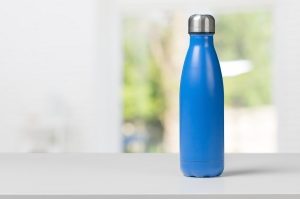Aluminum water bottles are generally considered safe, but because aluminum is reactive to acidic liquids, some are lined with an epoxy resin that can contain BPA. That’s the chemical in plastic that many people are trying to avoid by buying an aluminum bottle in the first place.
As with many products, it’s up to the buyer to beware. Research is key in determining the best reusable water bottle for you. Here’s a closer look and a list of alternatives to aluminum bottles.

Before understanding the issues with reusable water bottles, it’s important to understand BPA (bisphenol-A). BPA is an industrial chemical used to make bottles and cans since the 1960s. The chemical can leach into food products, including bottled water. Researchers have discovered possible health effects of BPA on the brain, behavior and prostate gland of fetuses, infants, and children, according to the Mayo Clinic, which also reports that there is a possible link between BPA and high blood pressure.
Many people have turned to reusable water bottles to avoid BPA, which is found in the plastic used for disposable water bottles. However, the epoxy resin used to line aluminum water bottles can contain BPA, according to Consumer Reports.
Many consumers are unaware of this issue, which defeats the very purpose of buying an aluminum water bottle.
But do all aluminum water bottles contain BPA? No. This is where your research comes into play. Many aluminum bottles now are lined with BPA-free epoxy resins, including those lined with copolyester tested by Consumer Reports.
This is a critical issue because tests have found that the epoxy resin in some aluminum water bottles actually has more BPA than the compounds used in polycarbonate plastic water bottles.
Because this was such a rampant rumor for so long, it’s worth noting that using aluminum products (such as cookware) is not associated with developing Alzheimer’s Disease. The Alzheimer’s Associations lists this as one of the myths surrounding the disease.
There are alternatives to aluminum water bottles that consumers should consider. Consumer Reports recommends uncoated stainless steel, aluminum bottles with a copolyester lining or plastic bottles made of Tritan copolyester.
A report from Michigan State University also recommended stainless steel. The drawbacks are the higher price, the fact stainless steel heats faster and the potential for a metallic taste. However, steel does not leach chemicals into the water.
Glass also is an alternative, according to Michigan State. Glass bottles are safe, and everything tends to taste better when sipped from a glass bottle. The cons are that they are more breakable, tend to not last as long, have a low recycling rate and are not allowed in some places.
The bottom line is for consumers to take the time and research what bottle is best for them. Just be aware of the potential dangers and steer clear of bottles that could potentially leak dangerous chemicals into your water.